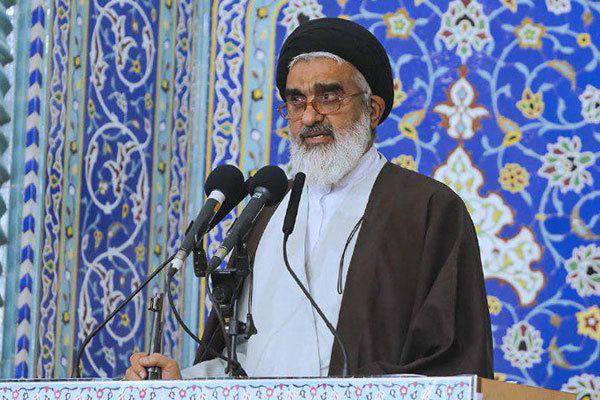The purpose of the enemies’ propaganda war is to create hopelessness and pessimism among the people

RNA – In his Friday prayer sermon delivered to a large and fervent crowd of believers in Qom’s Qods Prayer Hall, Ayatollah Sayyed Mohammad Sa’idi offered his condolences on the days of the commemoration of the martyrdom of Imam al-Husayn and said, “Tasu’a and Ashura were two decisive days in Shi’ah history.”
The custodian of the Holy Shrine of Lady Fatimah al-Ma’sumah stressed that the uprising of Imam al-Husayn was had an essence of anti-oppression and said, “At that time, the ‘tree of goodness’ of authentic Islam was under the influence of oppression, repression and distortion by the Umayyad dynasty but Imam Khomeyni’s uprising breathed a new spirit into Islamic society and revived the life of religion.”
He explained, “The pure Shi’ahs never submitted to the tyrannical rulers. Ashura is a model for the uprisings against the oppressors, especially the Islamic Revolution. From the beginning of the movement, in the words of the Imam Khomeyni and the slogans of the people, it was clearly emphasized that the influence of the Islamic Revolution comes from the uprising of Ashura. The similarity of Imam Khomeyni’s movement with the uprising of Imam al-Husayn was that in the Islamic Revolution, wasn’t only that there was opposition between the ruler and the people but there was opposition between two thoughts and two lines – intellectual and political.”
Ayatollah Sa’idi explained that the perspective of Imam Khomeyni and the people was toward Imam al-Husayn and Ashura but the perspective of the Shah [Mohammad Reza Pahlavi] was toward Cyrus and the imperial monarchical regime. “This regime decided to base the Iranian calendar on the beginning of the Persian Empire, cut off Iran’s links with Islam and tried to position Iran’s identity against an Islamic identity and assimilate Iran into the anti-value system of the West,” he said.
The representative of the Supreme Leader of the Islamic Revolution [Ayatollah Sayyed Ali Khamenei]in Qom said, “The Iranian nation has always commemorated the days of Tasu’a and Ashura and were inspired by these days. Tasu’a and Ashura have played an important role since the beginning of the Islamic Revolution, during the Sacred Defense [Iran-Iraq War] and during the suppression of the sedition of 2009 and this year, the believing people will commemorate these two days by protecting the canonical standards and will engage in mourning.”
He highlighted the Quranic analysis in the words of the Supreme Leader and noted, “The Quran states that friendship with one’s sworn enemies doesn’t make any change in their principled and rooted hostility as the enemies may pretend to be friends with believers and want to negotiate but they openly and secretly act with hostility and implement such hostility and if they overcome the believers, they will impose a variety of suffering, torture and grief.”
Ayatollah Sa’idi said that the Quran states that the main goal of the disbelievers is that they want to turn the believers into disbelievers and noted, “The American leaders who want to negotiate are nothing but cowards and deceitful people. People expect the officials to participate with dignity and authority in global organizations and not fall into the traps of the deceitful disbelievers.”
The Friday prayer leader of Qom stated that today, in addition to the economic war, the enemies have invested in a media and propaganda war, said, “The main roots of the propaganda war are in the hands of the United States and the Zionists, who are supported by some of the Qaroun’s [reference to arrogant, wealthy powers] in the region.”
He said that we must not exaggerate in our expression and criticism of the problems facing Iran and noted, “These exaggerations pollute the environment of country and frustrate and make the people pessimistic. Pessimism towards the revolutionary forces and institutions is a dangerous issue. Criticisms must be friendly and such criticisms are considered as a gift from the point of view of Islam and alongside the criticisms, the good things must also be expressed”
Ayatollah Sa’idi said, “If there are criticisms of the government organs, they must also state good things. Party and political motives must not disregard the good things. The important part of confidence building is the responsibility of the three branches of the government and government organs and the other part is the responsibility of the media organizations, the audience, the speakers on the pulpits as well as the people, because without the backing of the people, no government is unable to work.”
In conclusion, His Eminence made remarks about mourning and stressed, “Any kind of movement and program that gives an excuse to the enemies and malicious people must be avoided. In the circles and mourning groups, the utmost attention must be given to increasing knowledge and creating familiarity with the culture of the Ahlul-Bayt. Passion is a very good thing but it must not be such that one’s senses are lost in passion.”
Rasa News Agency
112/970